Last Updated: 20/05/2025
Scottish Fold Cat Complete Breed Guide
Interested in knowing more about Scottish Fold Cats? Take a look at our Scottish Fold Breed Guide. Facts and Care Tips for Owners from out Vet team
Author: Dr Carla Paszkowski BVSc (Hons)
Reading Time: 33 minutes - long read
Often described as 'owlish', these adorable floppy-eared kitties are sure to steal hearts wherever they go. With their copper-coloured eyes, floppy ear cartilage, and an extremely affectionate disposition, the Scottish Fold is a unique and special little creature.
We've put together a complete guide with everything you need to know before adopting a Scottish Fold. If you need any further info, check out our Discover Education Portal or our complimentary Vet Pet Plan service.
Facts about the Scottish Fold
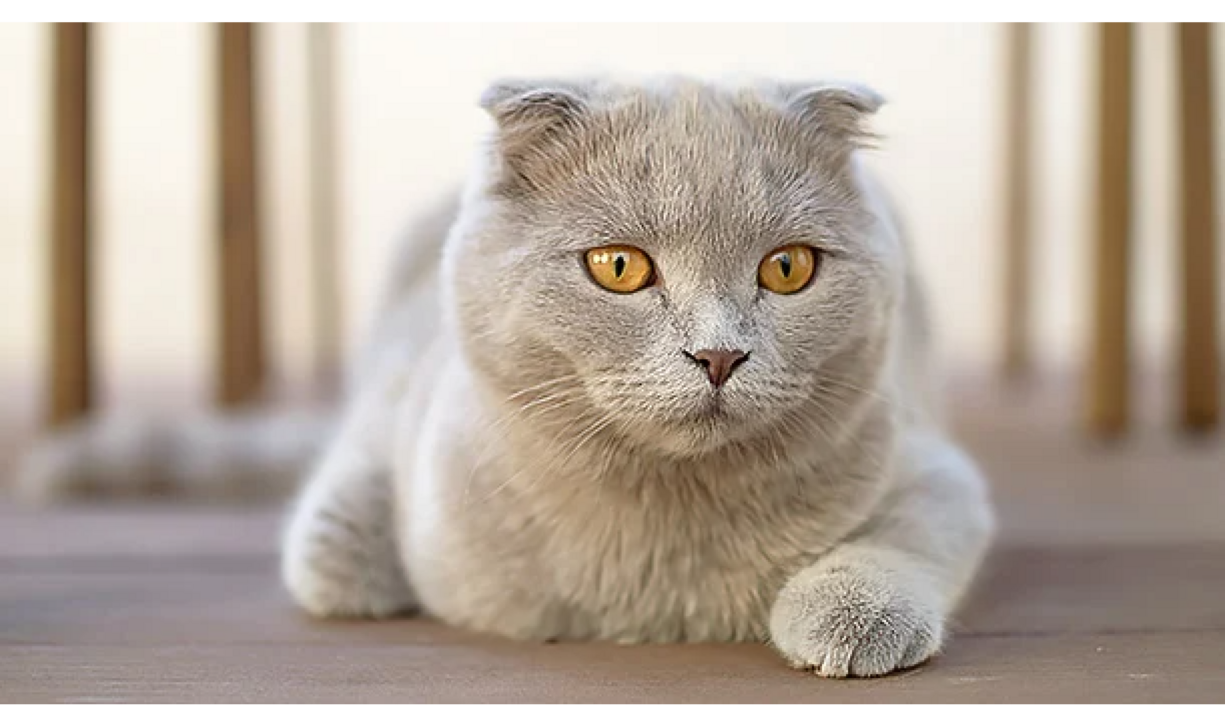
Place of origin:
Scotland
Energy level:
Moderate-Low
Coat type:
A variety of lengths
Shedding factor:
Average
Life Expectancy:
9-12 years
Tendency to vocalise:
Low, but do 'chirp'
Average Weight:
3.5-6kg
Overall grooming needs:
High maintenance
Other names:
'Lop-eared cats' / Scotties' / 'Folds'
Coat colours:
A wide variety of colours
Coat markings:
A variety of patterns
Temperament:
Affectionate, sweet, attention-loving
Scottish Fold History
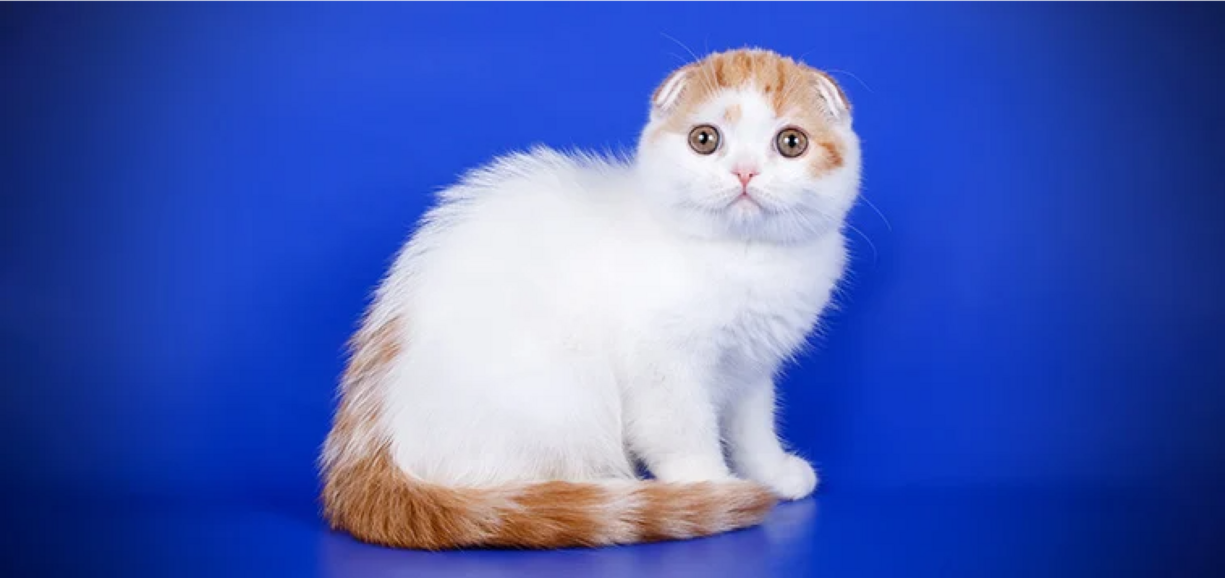
The Scottish Fold came about in the 1960s on a farm in the Tayside region of Scotland. A sheep farmer by the name of William Ross noticed an odd-looking white cat with folded ears hanging around his barn. This cat, who he named 'Susie', had a litter with a local tomcat which produced one female kitten with similarly folded ears. Ross went on to selectively breed from her and her offspring, and so the Scottish Fold breed began. It is believed thay every Scottish fold cat can trace their lineage back to Susie.
The Scottish Folds' characteristic floppy ears were originally not as pronounced as they are today. Originally they were only folded from about halfway up, tilting forward and downwards. Decades of selective breeding have caused more and more of a double or triple-fold appearance.
Ironically, the Scottish fold is to this day not a registered breed in Scotland and is not shown in Europe. In 1971 the UK's registration body for cats stopped letting cat owners register them as a breed, as they were worried about physical deformities (see more about this below).
Scottish Fold Distinguishing features
True to their name, Scottish Folds are most recognisable for their folded ears. But what causes it?
Floppy ears: A genetic mutation
Originally known as 'lop-eared' cats, it was discovered that the gene responsible for folded down ears is an incomplete dominant gene. This means that if a cat with folded ears breeds with a cat with the straight-eared gene, and the folded eared cat passes down their gene, their offspring will have folded ears.
Scottish Fold kittens are actually born with straight ears. They ears tend to 'flop' between 2-4 weeks of age. Sadly, the gene which causes the cartilage in the ears to become floppy (and oh so adorable!) also affects the cartilage all over the body.
Scottish Folds experience varying degrees of osteochondrodysplasia; a condition which affects bone development and cartilage formation and can lead to arthritis in cats and even joint fusion. Ankylosing spondylosis of the tail is particularly common, and so Scottish Fold owners are advised to gently handle their kitty's tail regularly to check for stiffness and pain. If any discomfort is noticed, it's best to get your kitty checked out straight away.
Due to these genetic abnormalities, Scottish Folds are never bred with other Scottish Folds. If two Scottish Folds are bred to one another, their offspring can suffer from genetic cartilage disorders so severe they may not be able to walk. Breeders instead cross their lines with straight-eared cats, such as the British Short Hair.
Scottish Fold Personality
Scottish Folds are known for being sweet, affectionate, and attention-loving. They seek the company of their humans and tend to follow their owners all over the house. They are not an ideal cat for those who need to leave them alone at home for long periods of time, unless there is a second cat in the house to keep them company.
They are a rather quiet breed and won't meow excessively throughout the day, but they tend to communicate with endearing 'chirping' noises.
Scottish Folds are well-known for being master posers. They are often found sitting up on their haunches like meercats, or flopping, stretching, and laying in a variety of quirky human-like positions.
They are also quite a clever little cat, and can greatly benefit from toys that encourage mental stimulation such as teaser cat toys like feathers and wands or interactive cat toys.
As a quiet and gentle breed, it's best to keep Scottish Folds as indoor-only cats. For any indoor cat, we recommend providing a nice tall cat tree or tower to help satisfy their climbing instincts.
Where Have I Seen Scottish Folds Before...?
Not sure where you've seen these cats before? Musician Taylor Swift has two Scottish Folds, named Meredith Grey and Olivia Benson, who feature heavily on her social media. Another social media-famous Scottish Fold is 'Maru', with thousands of fans worldwide.
Top lifestyle products for Scottish Folds
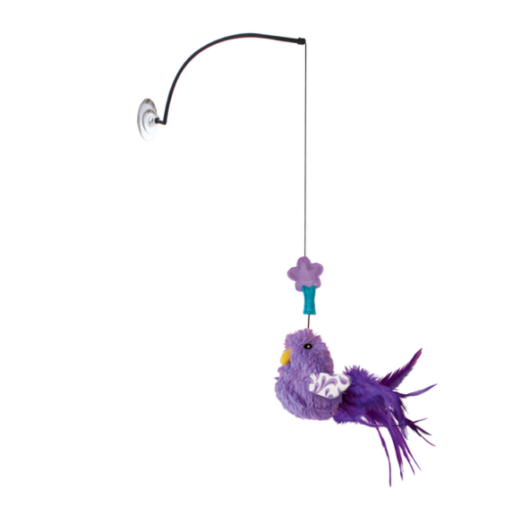
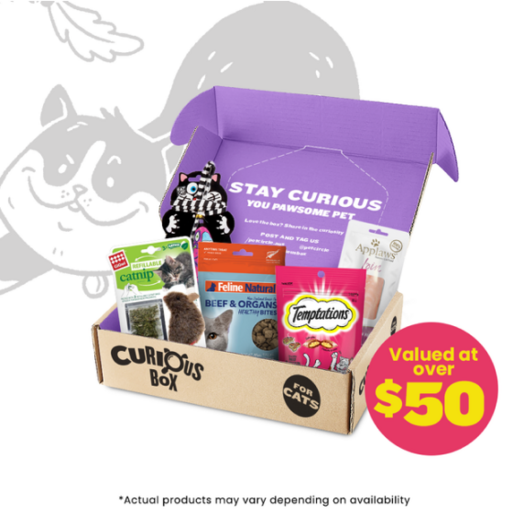
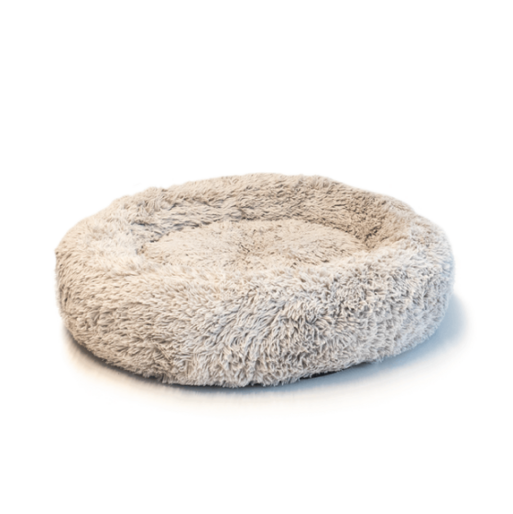
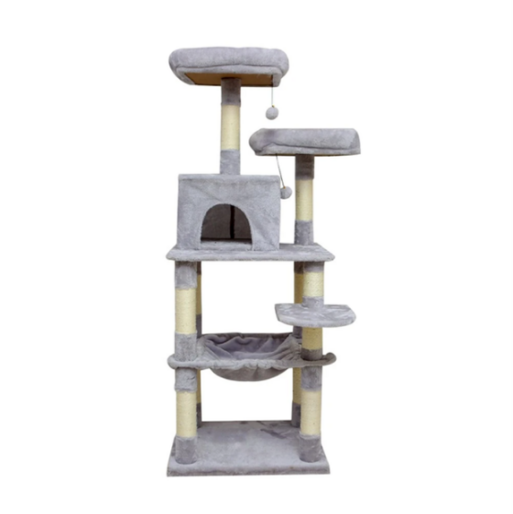
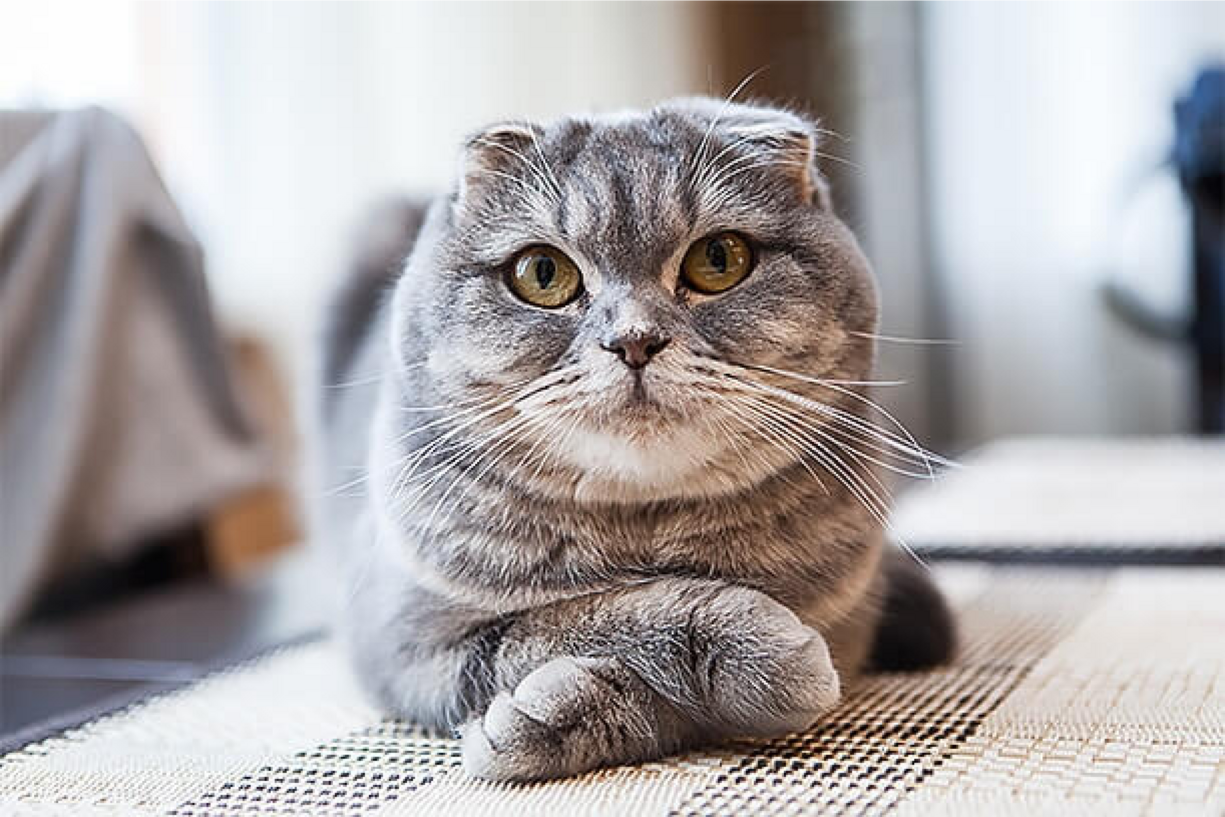
Scottish Fold Grooming
Ear Cleaning - while some Scottish Folds don't require regular ear cleaning, it is important to check their ears weekly for any discharge, debris, or irritation. If their ears are particularly tightly folded, they may require a weekly clean with a vet-recommended ear cleaner such as Epiotic or PAW Gentle Ear Cleaner.
Brushing - most Scottish Folds have fairly low-maintenance short fur, but regular brushing can help reduce excessive shedding and can be a nice part of bonding (particularly if you use a massage brush such as the Zoom Groom Rubber Brush).
Alternatively, see our full range of cat brushes and combs
Scottish Fold Diet and Nutrition
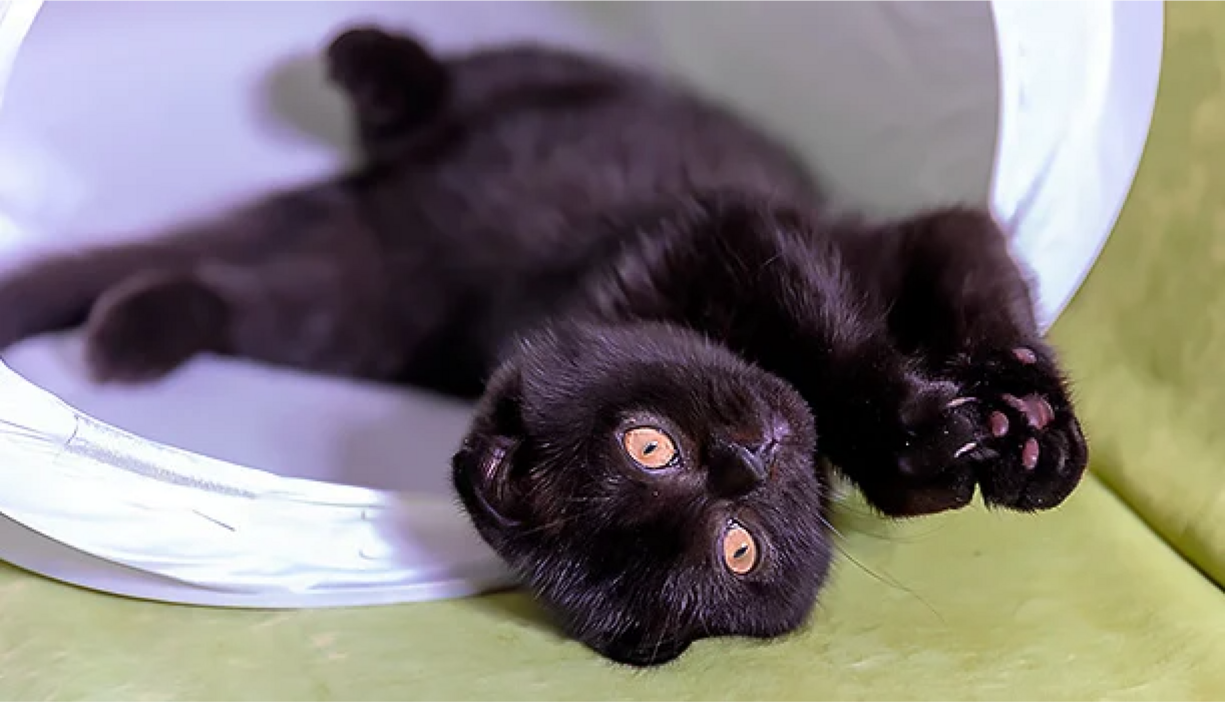
The Scottish Fold is a unique breed, but is still taxonomically within the domestic feline species, so their nutritional demands don't differ too much from other cats. They are a little less active than other cats, which means they can be prone to obesity. A premium indoor cat diet might be perfect for the indoor Scottish Fold, or general calorie-reduced cat food.
Due to their increased risk of arthritis and joint issues, it may also be beneficial to ask your vet about a joint-care therapeutic diet, or a tasty cat arthritis and joint supplement.
For Scottish Fold kittens, a kitten diet is required until they are fully grown, which is around the 12 month mark. We recommend a premium, Australian-made product such as Advance Wet and Dry Kitten Food.
Feeding regular wet food meals along with dry kibble is a simple way to increase your Scottish Fold's water intake to ensure adequate hydration and help support urinary tract health.
Want to know more? Check out our article on Ways to Increase Your Cats Water Intake.
Best Food For Adult Scottish Fold Cats
This diet from Royal Canin is specially formulated for indoor cats. With high digestibility, adapted calorie content, and specific fibre content, it is perfect for a healthy indoor Scottish Fold.
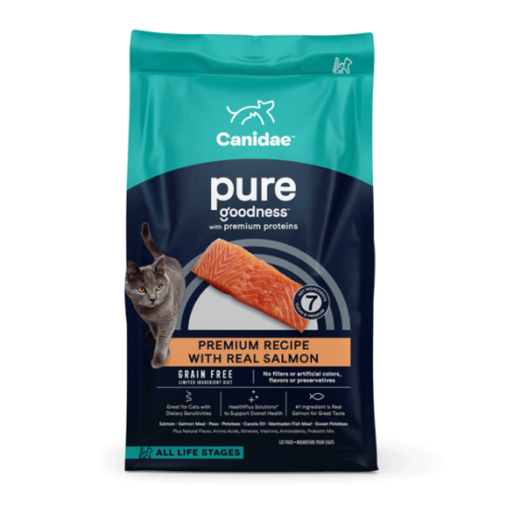
This all natural, limited ingredient food for cats is made with salmon and menhaden fish meal, so it's naturally high in omega fatty acids for healthy joint maintenance.
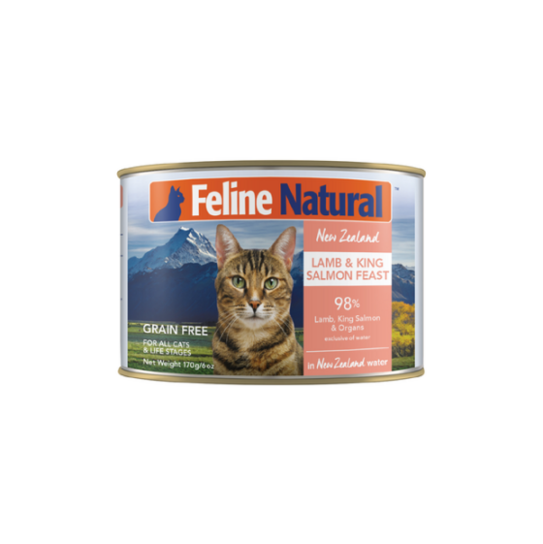
This premium, high-meat cat food is available in cans (pictured) or freeze-dried formulas. The natural ingredients and a high meat content are perfect for outdoor or active Scottish Folds.
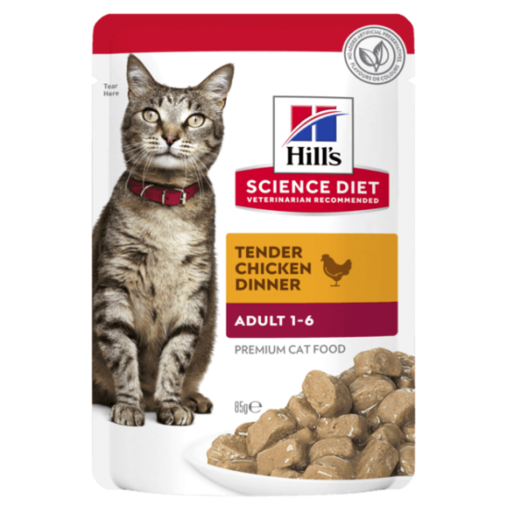
These high quality wet cat food formulas are easily digested and contain proven nutrition to support your Scottish Fold's health and wellbeing.
Best Food for Scottish Folds Kitten
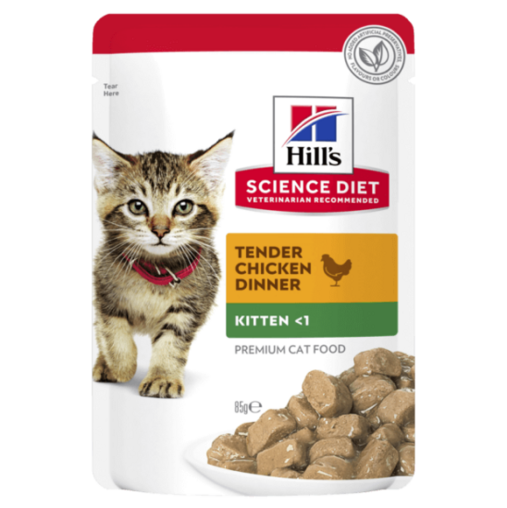
This premium quality dry and wet food contains an antioxidant blend to help strengthen your Scottish Fold kitten's immune system.
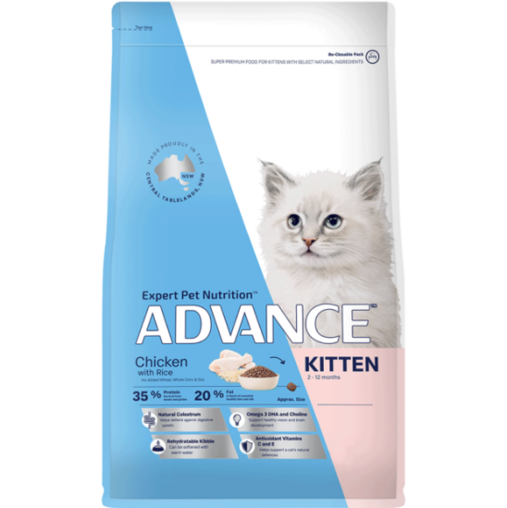
This super premium Australian made dry & wet food is complete and balanced to support the healthy growth and development of your kitten.
This premium recipe contains sustainably sourced salmon as the first ingredient, ideal as a protein source for gorwing kittens.
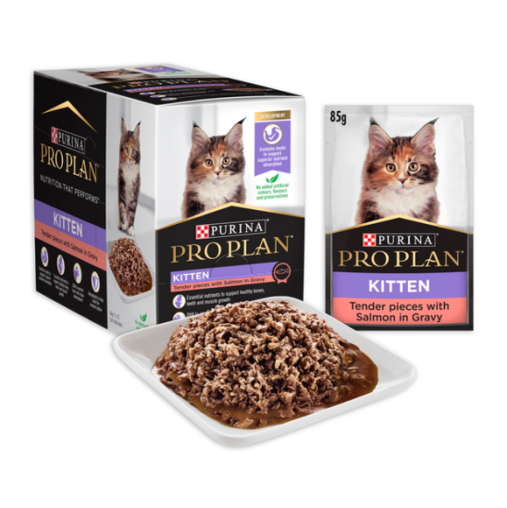
contain proven nutrition to support your Scottish
Fold kitten's health and wellbeing.
Scottish Fold Common Health Problems
Scottish Folds are particularly prone to cartilage abnormalities and degenerative joint disease and arthritis, especially in the tail, ankle and knee joints. Scottish Fold owners are advised to be aware of the signs of joint pain, and handle the tail gently from time to time to check for signs of pain.
Scottish Folds may also suffer from ear infections if regular ear cleaning is not maintained. Weekly ear cleaning with a gentle ear cleaner is recommended. They may also be prone to cardiomyopathy, a disease of the heart muscle.
Fun Facts about the Scottish Fold

Scottish Folds are often described as 'owlish' or 'teddy-bear-like'

They were originally named 'Lop-Eared Cats', due to their resemblance to lop-eared rabbits

Although they are beloved in Australia and the USA, they are not actually a registered breed in Scotland, the UK, or Europe

The gene responsible for the soft ear cartilage actually affects cartilage all over the body, and as a result all Scottish Folds are prone to bone and joint abnormalities.

A Scottish Fold should never be bred with another Scottish Fold, as their offspring will suffer from severe genetic deformities. Instead they are crossed with straight-ear breeds such as the british short hair.

Scottish Folds are master posers. They are well known for their habbit of sitting up on their haunches like meercats, or sitting, laying, and lounging about in human-like positions.

Taylor Swift has two Scottish Fold cats named Olivia Benson and Meredith Gray.
PAW Osteosupport Capsules help to relieve the symptoms of arthritis in cats using highly concentrated Green Lipped Mussel powder.
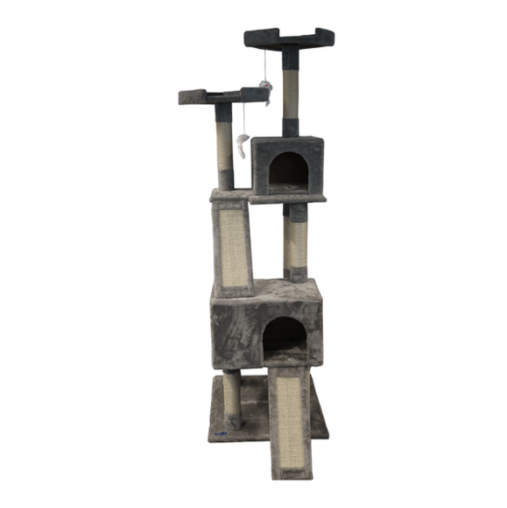
As an indoor cat, the Scottish Fold will benefit from plenty of high surfaces to explore, and cat trees are a great way to provide this.
Scottish Folds can be prone to ear infections due to the floppy nature of their ears. Keep them regularly cleaned with a gentle cleaner.
The Catit Senses Super Circuit is interactive and will keep any indoor cat entertained for hours.
Further Reading
Want to know more? Check out our Discover Page for more tips from our expert vets on keeping your pets happy and healthy.